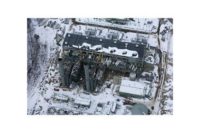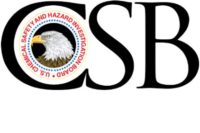The chairperson of the U.S. Chemical Safety Board (CSB) yesterday commended the International Code Council (ICC) and its members for revising the International Fire Code (IFC) and International Fuel Gas Code (IFGC) to prohibit the unsafe practice that killed six workers in a tragic explosion at the Kleen Energy power generation facility in Middletown, Connecticut. This week marks the fourth anniversary of the accident.
Dr. Rafael Moure-Eraso said, “All of us at the CSB were pleased to learn that the 2015 International Fire and Fuel Gas Codes prohibit the conduct of ‘gas blows,’ an inherently unsafe pipe cleaning methodology. We commend the ICC for this tremendous step forward.”
ICC’s action aligns with a similar prohibition developed by the National Fire Protection Association, acting on a CSB urgent recommendation.
How Kleen Energy tragedy happened
On February 7, 2010, contract personnel at Kleen Energy, a natural gas-fueled power generation plant then under construction, were conducting an operation known as a “gas blow,” whereby large quantities of natural gas are forced through piping at high pressure to remove any debris that could damage the turbine upon startup. The gas and debris were released to the atmosphere, accumulated in a congested area and ignited, triggering a massive explosion that killed six and injured at least fifty.
The CSB concluded that the practice of using flammable gas to clean piping is inherently unsafe, and that alternative non-flammable methods, such as blowing with compressed air, are efficient and readily available.
The ICC is a non-profit association whose model codes and standards are used in the design, build and compliance process to construct safe, sustainable, affordable and resilient structures. According to the ICC, the IFGC and IFC are in use or adopted in more than 40 states, the District of Columbia, Guam and Puerto Rico.
Still no action by OSHA
“ICC’s actions reflect an important shift in industry good practice,” said Chairperson Moure-Eraso, who noted that the 2015 IFC and IFGC will likely acquire the force of regulation in coming years, as state and local jurisdictions move to adopt them. “The strong actions by both ICC and NFPA on fuel gas safety blaze a trail for regulatory action by OSHA on this topic.” The CSB recommendation for OSHA to develop a fuel gas standard have not yet been acted upon.
Dr. Moure also expressed the CSB’s appreciation that the 2015 IFC requires cleaning and purging operations to comply with the requirements of the National Fire Protection Association’s NFPA 56: Standard for Fire and Explosion Prevention During Cleaning and Purging of Flammable Gas Piping Systems. Developed in response to an urgent recommendation from the Board, the NFPA 56 standard provides safety requirements for a variety of fuel gas processes, including cleaning of gas piping and purging gas equipment into or out of service.
Other occurrences
A 2009 explosion at the ConAgra Slim Jim plant in North Carolina, which the CSB investigated, occurred when new gas piping was purged into service and gas was vented inside a building. New NFPA requirements adopted in response to CSB urgent recommendations prohibit this practice.
In addition to commending the 2015 IFC’s prohibition of inherently unsafe gas blows, Chairperson Moure-Eraso praised the IFC’s new requirements for hot work operations involving storage tanks holding flammable or combustible liquids.
“The CSB continues to learn of serious injuries and fatalities resulting from the ignition of flammable vapors or liquids during hot work,” said Dr. Moure-Eraso. He cited as an example the Board’s investigation of an explosion at the DuPont Yerkes facility near Buffalo, New York, that killed one contractor and seriously injured another.
“We are very pleased that the 2015 International Fire Code essentially codifies the seven key lessons developed by the CSB in our 2010 hot work safety bulletin. The 2015 IFC requires consideration of alternatives to hot work, the analysis of potential hazards and methods of hazard control, the use of combustible gas detectors in and around the area, the use of hot work permitting systems, the training of employees and contractors, and the provision of safety supervision. All of these are essential to promoting the safe conduct of hot work,” he said.
The CSB is an independent federal agency charged with investigating industrial chemical accidents.





